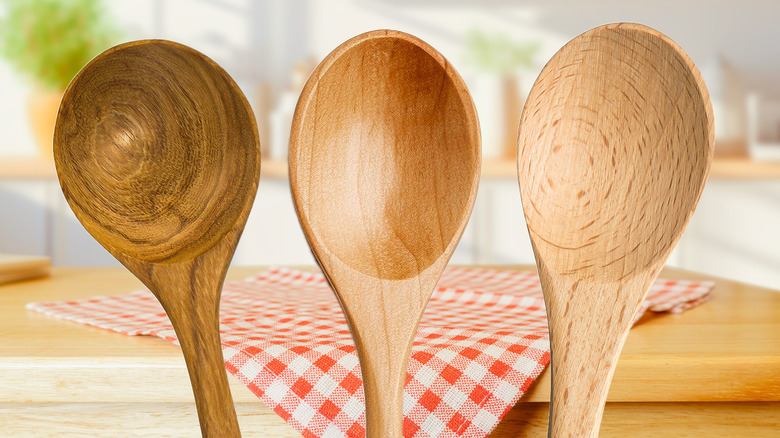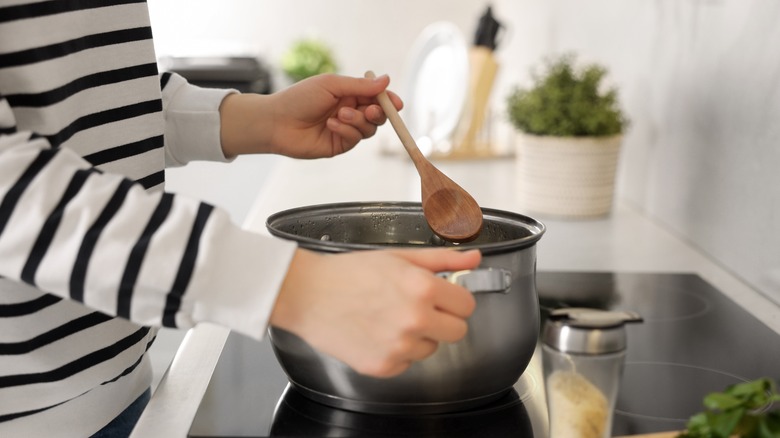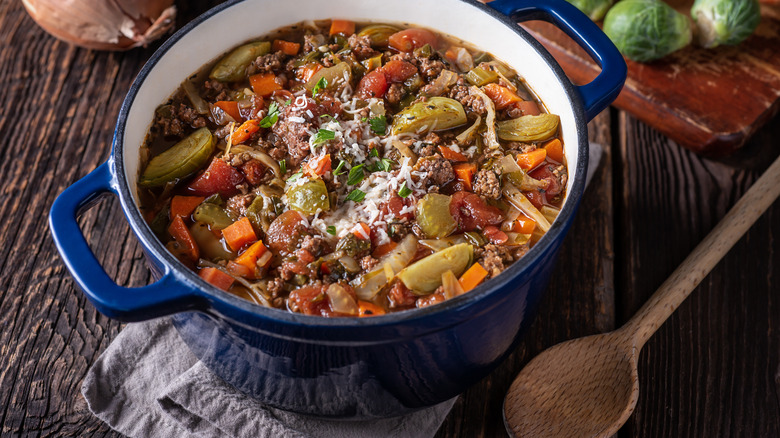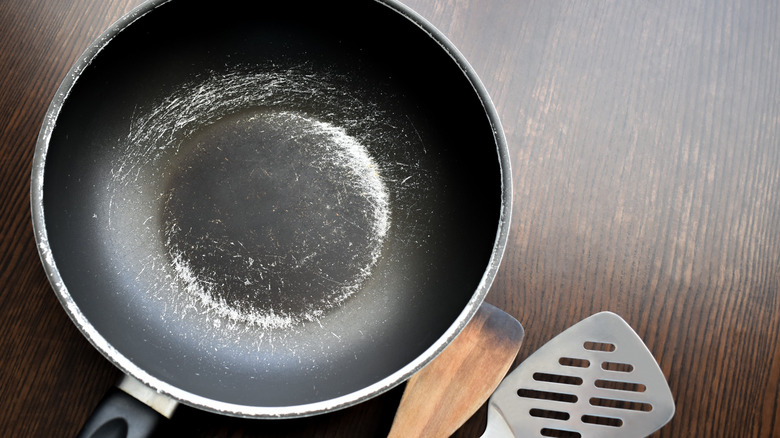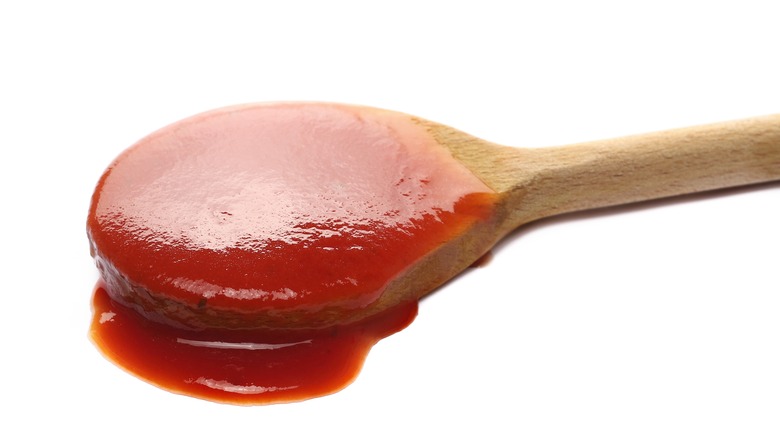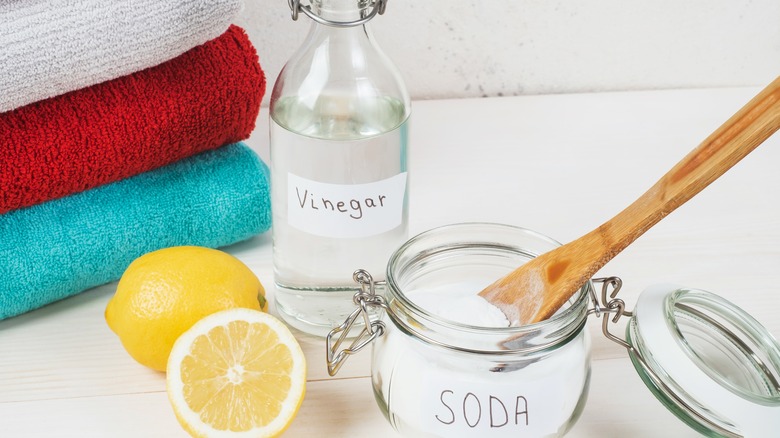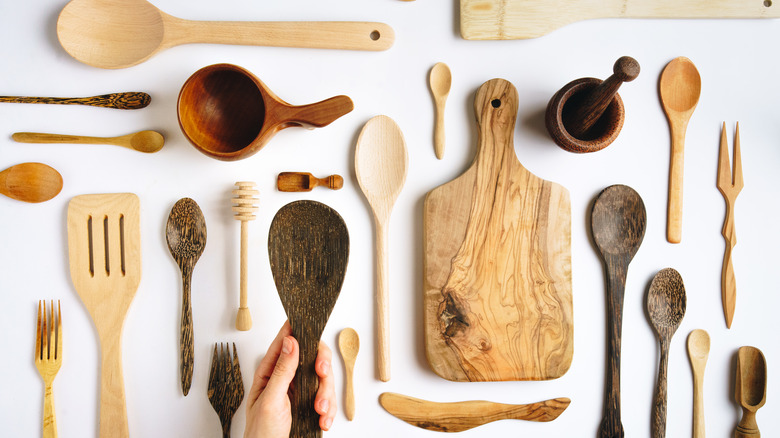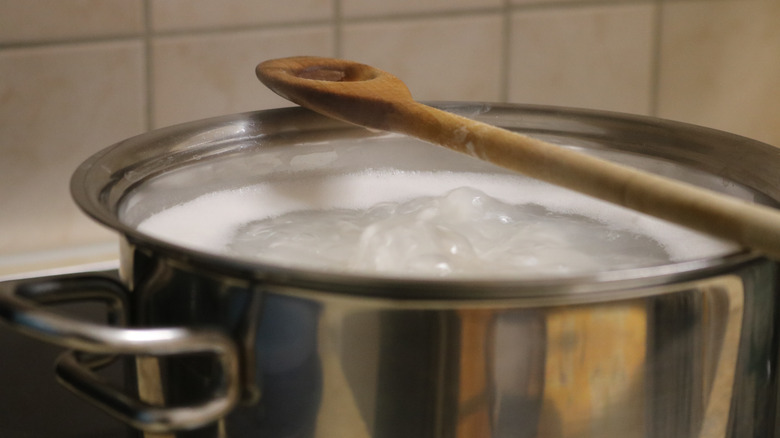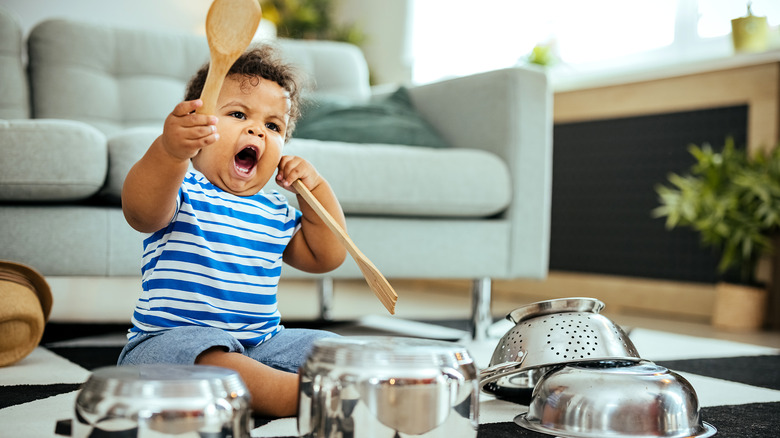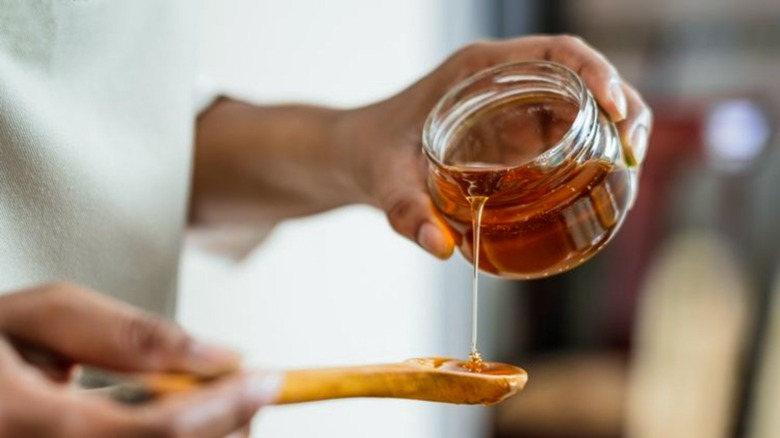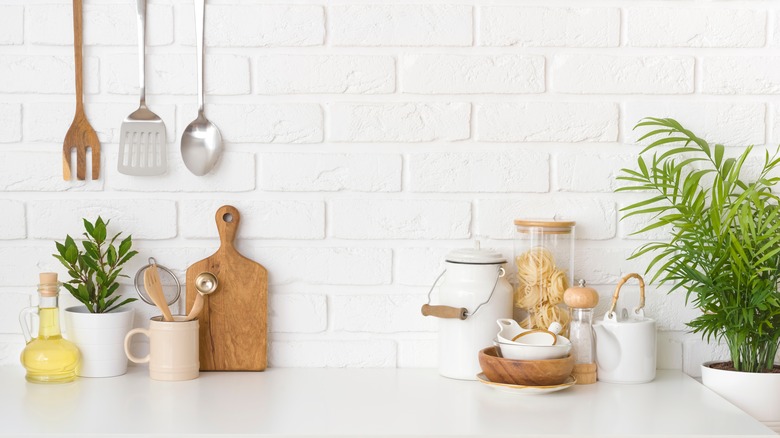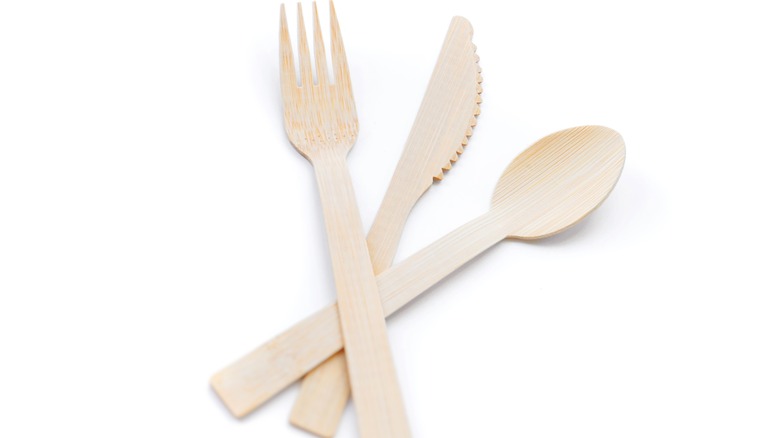Wooden Spoons: Should They Really Be In Your Kitchen?
One of the oldest and most familiar cooking utensils in every kitchen is the wooden spoon, passed down from a grandmother or just chilling at the back of the utensil drawer. This trusted tool has a much longer history than you think, as it was present in prehistoric records from the 4th century, with the oldest one found in the tomb of a pharaoh over 3,000 years ago. Your grandma's wooden spoon doesn't seem so old now, huh?
However, the wooden spoon has seen a phasing out of sorts since it's not the preferred cooking tool in most kitchens nowadays, with materials like silicone, stainless steel, and rubber having taken the limelight. The wooden spoon became unpopular in the 1990s when people discarded it for fear of it harboring bacteria. Wood's porous quality gave rise to this concern, and a lack of research to refute the claim led to the wooden spoon dying out.
But was the poor spoon really to blame? Not exactly. Simply caring for your wooden spoons (and wood utensils in general) can help prolong their life and serve you in many ways in the kitchen, from cooking on high heat to scraping the pan without fear of scratching them. Just don't use wooden spoons to scramble eggs, as this utensil has some limits, albeit little. Below, you'll find all the tips, tricks, and caveats to wooden spoons, helping answer the question: Should they stay in your kitchen or make a trip to the Goodwill bin?
Wooden spoons don't retain heat or alter food temperatures
It's far too common an occurrence to leave your cooking spoon in the pan for a few seconds and reach back to find a scalding utensil that burns your hand on contact. That's usually the case for stainless steel utensils, which heat quickly if left in or near a pot on the stove, as steel is a good conductor of heat. Opting for non-conductor tools like ones made from plastic, rubber, or silicone isn't a better option, as these materials melt when exposed to heat for too long. The best utensil for high-heat and time-consuming cooking like broths, stews, and making sauces is to use a wooden spoon, which is a poor conductor of heat and stays roughly the same temperature throughout cooking.
Another benefit to the wooden spoon is that it doesn't alter the temperature of your food, allowing even heat while cooking. This is ideal for temperature-dependent recipes like making caramel, candies, browning butter, melting chocolate, etc., which require a uniform temperature that metal utensils can disrupt as they're naturally cool. Some chefs also recommend the wooden spoon for food that you need to stir and taste simultaneously and for making quick-stir recipes like a roux since it won't heat up while you add other ingredients.
They're versatile tools that can be used for all types of cooking
Home cooks and chefs alike have that one utensil they use for every little task in the kitchen, from sautéing vegetables to mixing cake batter. We're here to convince you why that tool should be a wooden spoon. Wood utensils, in general, are incredibly versatile as they come in all shapes and sizes, and the wooden spoon is especially useful as its sturdy material offers a comfortable grip, perfect for longer recipes that require frequent stirring.
This timeless tool is recommended by chefs for most recipes and is especially helpful in heavy-duty cooking with dense ingredients that need a lot of elbow grease to combine, such as a thick curry. It's also the ideal tool for baking, as nothing gets cookie dough to come together better than a wooden spoon, and gentler processes like stirring soups. We're not opposed to using a wooden spoon as a cake decorating tool either, as you can spoon dollops of frosting on your cake and use the back of the spoon to spread it out in an artfully messy fashion. However, there are a few things the wooden spoon can't mix efficiently, like a light egg white or whipped cream, since its sturdy structure could deflate their volume.
They're non-abrasive and non-reactive
Just like there's a right pan for every recipe, there are the right utensils to go with them. Kitchen tools that scratch the surface of your kitchenware (like metal spoons and spatulas) often release chemicals encased in the pan's lining, which then get incorporated into your food. This is the case for your nonstick pans made from Teflon, a man-made chemical, which is safe for cooking under temperatures of 500 degrees Fahrenheit. In the case of cast iron and stainless steel pans, scratches can cause them to rust as well, reducing their lifespan.
To avoid possible contamination with your food and scratching your favorite cookware, wooden spoons are the way to go. The soft wood means that you can use them with ease, even in recipes needing rigorous scraping and stirring. Additionally, owing to their natural material, wooden spoons don't react with acidic foods the way metal spoons do to leave an aftertaste, so they're ideal for pickling, canning, and cooking acidic foods in general. Wood spoons also won't leech any chemicals into your food with consistent use the way some plastic and nonstick utensils do, making them an overall ideal choice for cooking.
Wooden spoons can retain flavor and stain with use
It's not all rainbows and roses with even the best wooden spoons, since their drawbacks are the reason many have stopped using them in the kitchen. Wood is a naturally porous material, which is why utensils made from it tend to stain when used with pigmented foods. Vegetables like beets and tomatoes usually leave a hue behind, and so do pigmented spices like turmeric and garam masala, staining the spoon for future cooking. Although the color of your wooden spoon won't affect its functionality, you can use varying wood utensils for different recipes to avoid cooking with a stained spoon every time.
However, the porous nature of wood doesn't only stain, but also retains flavor and may develop a slight odor over time. This quality of wood is the reason many avoid using it for dessert-making, as it can leave a savory taste in your sweets. However, you can easily rid your wooden spoons from stains and flavor with a simple cleaning method. Scrub your spoons with a halved lemon or a paste made from baking soda and water. Let the spoons sit with these applications for a bit, followed by a gentle cleanse of hot water and dish soap. Voilà — you have clean spoons that will last as long as you need them to.
They have a specific (and easy) cleaning method
Being the oldest cooking tool, wooden spoons should be pretty easy to clean, since people in prehistoric times used them without the dishwashers and detergents of today. Fortunately, that's true for modern wooden utensils as well, which require only a quick wash with hot water and dish soap after cooking to get them fairly clean. It's also important to prop them up afterward to dry properly, as any standing moisture will cause the wood to swell. Since wood absorbs water, which can cause it to splinter and crack, this is also the reason you should never put wooden utensils in the dishwasher, as the bursts of hot water in the appliance and harsh dishwasher detergents can render the spoon useless pretty quickly.
Another way to care for your wooden spoons is to oil them every month or so, which prevents cracking and ensures that they last a long time, much like seasoning a cast iron skillet. Dry your spoons after washing, and use food-grade mineral oil or beeswax to lightly coat the spoon using a dishcloth. Let the spoons dry overnight, and remove any excess oil with a cloth before cooking with them.
They're long-lasting and don't break with consistent use
Wooden cooking tools seem to have a permanent place in every utensil drawer, outlived only by your grandmother's Kitchen Aid. The reason they last quite a while depends on a few factors, including proper cleaning, oiling, and the quality of wood. There's a recent trend in using bamboo for cooking utensils since it's an environmentally friendly option that adds to the look of your kitchen. However, you could consider using wood utensils made from a fine-grained hardwood material since these aren't too porous and retain moisture and food stains much less. The ideal hardwood materials include walnut, maple cherry, olive, and mesquite, while softwoods like red oak are more porous and tend to retain moisture and stains.
Maintaining the proper care of your wooden spoons can become laborious, so it's understandable if you start to shirk in their upkeep. Wooden utensils can become stained, splintered, or slightly swollen over time, so it's best to discard them after five years or so of use. However, if they develop mold, discard them immediately to avoid contaminating your food.
The wooden spoon over boiling water hack really does work
There's an old wives' tale about preventing a pot of boiling pasta water from spilling over by placing a wooden spoon over it, and no, it's not because the wood comes from the Enchanted Forest. Turns out, this simple hack is actually pretty effective, and has science to back it up. Boiling water on its own won't bubble over, but adding pasta to it gives the water a starchy boost, causing the evaporating bubbles to amp up and rise. Here's where the wooden spoon comes in, acting as a repellent on the water when it rises and bringing it down by its cooler temperature, which allows the water to condense and release as steam. Chef Geoffrey Zakarian says the trick actually works, too, so now you have celebs and science both to back it up.
However, over water and in water aren't synonymous here, so don't boil wooden spoons to remove cooking residues on a deep cleaning whim. That's because immersing the spoons in high heat removes the wood's protective finishes and strips it of the oils used to preserve them.
Wooden spoons have a number of uses aside from cooking
The marvels of wooden spoons aren't limited to cooking, as this tool is a savior for quick fixes around the kitchen. Take the arduous task of deseeding a pomegranate, for example, by slicing the fruit and whacking it a few times with the back of a wooden spoon. The seeds should all come popping out with only a few stray flecks of pith. That's not all; use wooden spoons to poke holes in your cakes for fillings and sauces, as they make perfectly uniform holes. They're also a great fix if you don't have a thermometer to check your oil's temperature; simply dip your spoon's handle in hot oil, and if it bubbles, you're ready to fry. Other uses are fairly common for any tool — like propping open an oven door to keep your goods warm and sliding it between cabinet handles when they don't close all the way.
However, a real game changer is the wooden spoon trick Aarón Sanchez learned that will change the way you make rice. He learned the trick from a Puerto Rican woman, which takes all the measurement confusion out of cooking rice. She would add water followed by rice, stir it, and when the wooden spoon stood up straight, that meant the ratio was perfect. Not sure about you, but this makes us rush to the kitchen to make some magic rice!
They protect your food from bacteria
One of the reasons people don't use wooden spoons as frequently is the fear that they harbor bacteria due to the porosity of wood. However, this simply isn't the case, as wooden cooking utensils are antimicrobial, preventing the spread of bacteria in your food. Wooden utensils and cutting boards do not have any record of causing foodborne illnesses. The capillary action of wood allows water and bacteria from outside to diffuse into it, snuffing out the surface bacteria with an unfavorable environment in which to grow.
The only caveat to wood being a food-safe utensil is not drying it properly. You should dry wooden utensils for at least 24 hours in an upright position; otherwise, the utensil won't be able to bring its antimicrobial properties into play.
Dr. Karl tells ABC Science on YouTube that there was a big move away from using wooden utensils for cooking in the '90s due to a concern over bacterial growth. However, he assures the same as above, stating that bacteria entering the spoon die out from lack of nutrition, rendering the tools safe for use.
They're aesthetically pleasing
Aside from being one of the cooking tools every kitchen should have, wooden utensils, cutting boards, and trays are an aesthetically pleasing accessory that can amp up your kitchen decor in a chic and effortless manner. The cool tones and spiral patterns of wood go well with nearly every kitchen interior, and propped up in a utensil jar in your kitchen, they serve as both an accessory and a quick tool to grab while cooking.
Favorite celebrity chefs like Martha Stewart and Ree Drummond, aka the Pioneer Woman, have also come out with lines of their wooden spoons made from polished walnut wood and rustic olive wood. If it helps you get more interested in cooking to have the same utensils that your favorite chefs use, wooden spoons are a great place to start. Even the most expensive ones will be an investment and a lasting purchase, although it's better to start with an affordable set to see if they're the right fit for you.
Wooden spoons are a sustainable cooking utensil that promote biodiversity
In recent years, we've seen a shift from plastic utensils, packaging, and other products to more sustainable options. That's because pollution from plastic alters natural habitats and can disrupt an ecosystem's ability to adapt. With so many kitchen tools having some form of plastic in their composition, if you're interested in a more eco-friendly home, it's important to shift to biodegradable utensils for cooking and eating, such as those made from wood.
A 2021 study in the International Journal of Academic Multidisciplinary Research found wooden utensils to be a sustainable alternative to plastic ones. The respondents found that wooden utensils were hygienic, more durable than plastic, better in managing waste, and promoted biodiversity by helping produce plants and trees. So stick to your trusty wooden spoon in the kitchen, as it's doing a lot more good than just preventing pasta water from bubbling over.
